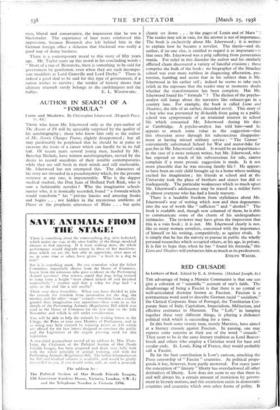AUTHOR IN SEARCH OF A " FORMULA "
THOSE who know Mr. Isherwood only as the part-author of The Ascent of F6 will be agreeably surprised by the quality of his autobiography ; those who know him only as the author of Mr. Norris Changes Trains, slightly disappointed ; but all may pardonably, be perplexed that he should he at pains to excavate the roots of a career which can hardly be in its full leaf. Of recent years several young men, headed by Mr. Beverley Nichols, have written autobiographies, moved by the desire to record anecdotes of their notable contemporaries while they are still fresh in their minds and still marketable. Mr. Isherwood has not attempted this. The characters of his story are shrouded in a pseudonymity which, for the present reviewer at any rate, is impenetrable. Who is the dapper medical student, the Don Juan of Holland Park Rink, who is now a fashionable novelist ? Who the imaginative school- master who, it is ironically recorded, found " a formula which would transform" his "private fancies and amusing freaks and bogies. . . . not hidden in the mysterious emblems of Diirer or the prophetic utterances of Blake . . . but quite clearly set down . . in the pages of Lenin and of Marx " :- The reader may ask in vain, for the answer is not ocimportance. The book is exclusively about Mr. Isherwood ; it is written to explain how he became a novelist. The thesis—and the author, if no one else, is entitled to regard it as important—is that once Mr. Isherwood was a prig suffering from persecution mania. For relief in this disorder the author and his similarly afflicted chum discovered a variety of fanciful evasions ; these comprise the bulk of the book ; no biographer of the Strachey school was ever more ruthless in diagnosing affectation, pre- tension, humbug and secret fear in his subject than is Mr. Isherwood in his earlier self ; indeed he seems to take such relish in the exposure that the reader may at moments doubt whether the transformation has been complete. Has Mr. Isherwood found his " formula " ? The diction of the psycho- analyst still hangs about the narrative like exhaust-gas in a country lane. For example, the book is called Lions and Shadows, the title of an earlier, discarded novel. This story of a boy who was prevented by ill-health from going to a public school was symptomatic of an irrational interest in school life which consumed Mr. Isherwood during his days at Cambridge. A psycho-analyst has told him—and he appears to attach some value to the suggestion—that this obsession arose through his subconscious disappoint- ment at having missed military service : " The Censor " conveniently substituted School for War and motor-bike for gun fire in Mr. Isherwood's mind. It would be an impertinence in the case of a more reticent writer, but Mr. Isherwood, who has exposed so much of his subconscious for sale, cannot complain if a more prosaic suggestion is made. Is it not more plausible that he was missing family life ? He appears to have been an only child brought up in a home where nothing excited his imagination ; his friends at school and at the University took the place of brothers and sisters but did so inadequately. The particular weaknesses which so much upset Mr. Isherwood's adolescence may be traced in a milder form in almost everyone who has had a lonely nursery.
There is a laudable freedom from stylishness about Mr. Isherwood's way of writing which now and then degenerates into the use of words like " sufficient " and " alcohol." The book is readable and, though now ashamed of them, he is able to communicate some of the charm of his undergraduate intimacies. The reviewer may have given the impression that this is a vain book ; it is not. Mr. Isherwood clearly is not, like so many women novelists, concerned with the importance of himself or his writing, competitively, as against rivals. It is simply that he has the naivety to pursue in public the wholly personal researches which occupied others, at his age, in private. It is fair to hope that, when he has " found his formula," this Lions and Shadows will embarrass him as much as its predecessor.
EVELYN WAUGH.










































































 Previous page
Previous page